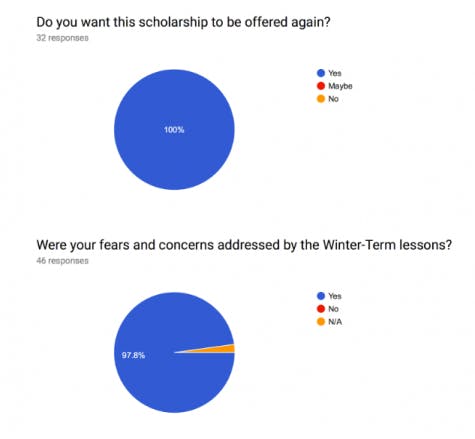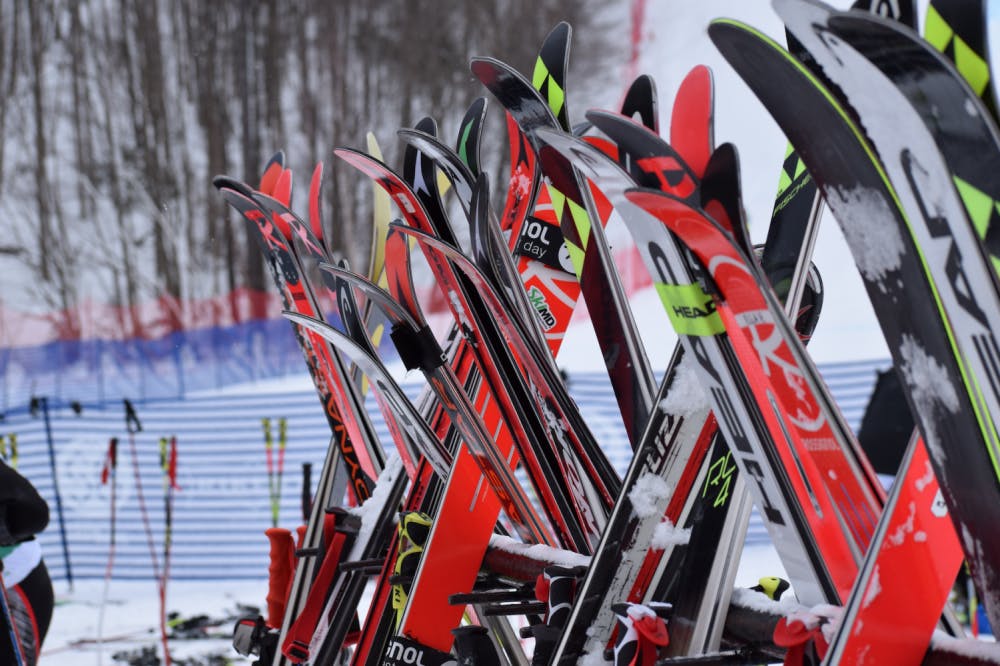Thanks to a $20,000 fund, the Ski and Snowboard Scholarship pilot program that brought 103 new skiers up to the Snow Bowl this Winter Term will continue into future seasons. The fund, compiled by Student Affairs and the Dean of Students, helps students dodge the steep costs of winter sports by providing each participant with five ski, snowboard or telemark lessons and equipment rentals at the Bowl.
This past Tuesday, Vice President of Student Affairs Baishakhi Taylor met with students, college administrators and Daphne Diego, administrative director of the Middlebury Snow School, to discuss the future of the scholarships. Based on positive feedback from the pilot program, they secured funding so that the subsidized lessons can be offered in years to come.
Chief Diversity Officer Miguel Fernández will allocate an additional $1,600 to help cover extra ACTR buses to the Bowl on busy days.
This year, the scholarships helped boost involvement in the ski and snowboard lessons. In total, a record-breaking 201 students participated in ski or snowboard lessons over Winter Term this year, nearly half of whom were part of the scholarship program.
“Skiing is expensive, and we are welcoming students from all over the world, all over the country, where skiing is not something you will have natural access to, in terms of geography,” Taylor said. “So how do we make that something that is available to everyone if they want to try it? And I think that was the philosophy, was that if a student is interested, we have this amazing opportunity and facility. We want students participating in the full Middlebury experience.”
Sabian Edouard ‘21 and Rodney Adams ‘21 both took part in the scholarship program over Winter Term. Edouard chose to take snowboarding lessons and Adams opted for ski lessons. Both students felt that the scholarships made skiing and snowboarding more accessible.
Edouard’s snowboarding skills drastically improved and he was asked to become a snowboarding instructor next season.
“Where we come from, we don’t have these sort of experiences,” said Edouard, a Chicago native. “But also, when you get to Middlebury, especially as a first-generation student, a lot of the kids have this familial tie (with skiing and snowboarding) and leisurely activities that might not be as prominent in another environment. So being a part of that experience made me feel closer to being a Middlebury student.
“There’s been a stigmatization surrounding the POC and snowboarding at this campus, and I think that the scholarship is a great way to bridge that gap,” he added.
Adams, who is the first person in his family to learn how to ski, said that learning the sport made him feel more comfortable going to the ski races during Winter Carnival and talking with his fellow students about skiing.
“[The Snow Bowl] is a whole different social environment,” Adams said. “It’s another part of campus that we socialize at. Skiing is another way we can be active, especially during the winter when you can’t do anything else, so you might as well ski or snowboard.”
In a sport that has historically been dominated by affluent white people, the scholarship is an important step the college has taken to ensure that skiing and snowboarding is available to all Middlebury students. Skiing is ingrained in campus culture through traditions like Winter Carnival and Feb graduation, during which February graduates ski or ride down the Bowl in celebration.
In addition, skiing and snowboarding have their own languages and vocabularies that may not be familiar to non-skiers. A skier may “carve” (make turns with your edges) down “fresh corduroy” (a run that is freshly groomed) before heading into the ski lodge for “apres-ski” (the socializing that occurs after a long day on the mountain).
Jacob Freedman ’21 and Alex Gemme ’21, who were in attendance at Tuesday’s meeting, played instrumental roles in creating the scholarship program. They initially acquired around $5,500 dollars this past Fall, pulling funds from the Student Government Association, the Seizing Opportunities fund, the Mountain Club, Wonnacott, Brainerd, Ross, and Cook commons and the Intercommons Council. When the demand for scholarships quickly surpassed the available funds, the administration agreed to cover all remaining need, contributing an additional $15,000. This allowed every student on financial aid who applied for a snow scholarship to receive one.
Students enrolled in the scholarship program filled out surveys after completing their lessons asking them to rate and comment on various aspects of the program. The survey revealed overwhelmingly positive feedback, with 100% of 24 respondents rating 5 out of 5 point scale to the question, “Was this scholarship beneficial to your Middlebury and Winter-term experience?”
100% of respondents marked yes to the question, “Do you want this scholarship to be offered again?” and 97.8% of 46 respondents said yes to the question, “Were your fears and concerns (of skiing or snowboarding) addressed by Winter-term lessons?”
Survey respondents, all of whom remained anonymous, left comments giving feedback on the program.
“Being a kid from Chicago, I never thought I would get the opportunity to come to a place like Middlebury and be able to enjoy a sport like skiing,” one survey respondent wrote. “The Snow Scholarship was a significant part of my J-Term experience…..Without the funds provided by the scholarship, I would have never been able to ski since it is such a costly sport.”
Participants were also asked about their favorite part of Winter-Term lessons. Many respondents commented on how fast they improved and “learning how to ski in a comfortable environment.”

Survey responses showed near-unanimous satisfaction with the scholarship program among participants.
Other participants enjoyed meeting new people and learning from the snow school instructors. Most instructors are Middlebury students, but some are adults with decades of teaching experience at the Bowl. One survey respondent indicated a positive experience with the teaching method used by ski instructors.
“It started slow and progressed once I was ready for the next step,” wrote the respondent. “I also really enjoyed having peers at almost all the lessons, but really appreciated the help of the ‘older’ folks. I think it was great to learn from someone my age, and also from someone that has been skiing for 30+ years. (It) made me feel much more comfortable in a situation where I was nervous and afraid.”
The participants were also asked for suggestions to improve the lessons and the scholarship program in the future. Some common recommendations were to have more instructors and lesson times, to better place skiers within a group of their ability level, to inform students of injury risk and to be more organized. Other students suggested making the program more widely publicized.
In response to student feedback, Gemme and Freedman are planning to streamline the sign-up process for the scholarships applications. They are also working on establishing a check-out system for borrowing snow pants and gloves.
One respondent felt that, while their ski skills improved during the 5 lessons, they will not be able to continue skiing in the future due to the high cost of the sport.
“I was glad that the scholarship was offered. As someone that is low-income, I would never have been able to afford any kind of ski lessons or rentals” she said. “I now know how to ski, but because of the high cost associated with rentals and lift tickets it is very unlikely that I will be skiing again this ski season. I cannot express how thankful I am for the opportunity to have been able to learn to ski.”
Snow Bowl Will Continue Ski School Scholarship Program Next Year

COURTESY PHOTOS
Comments



